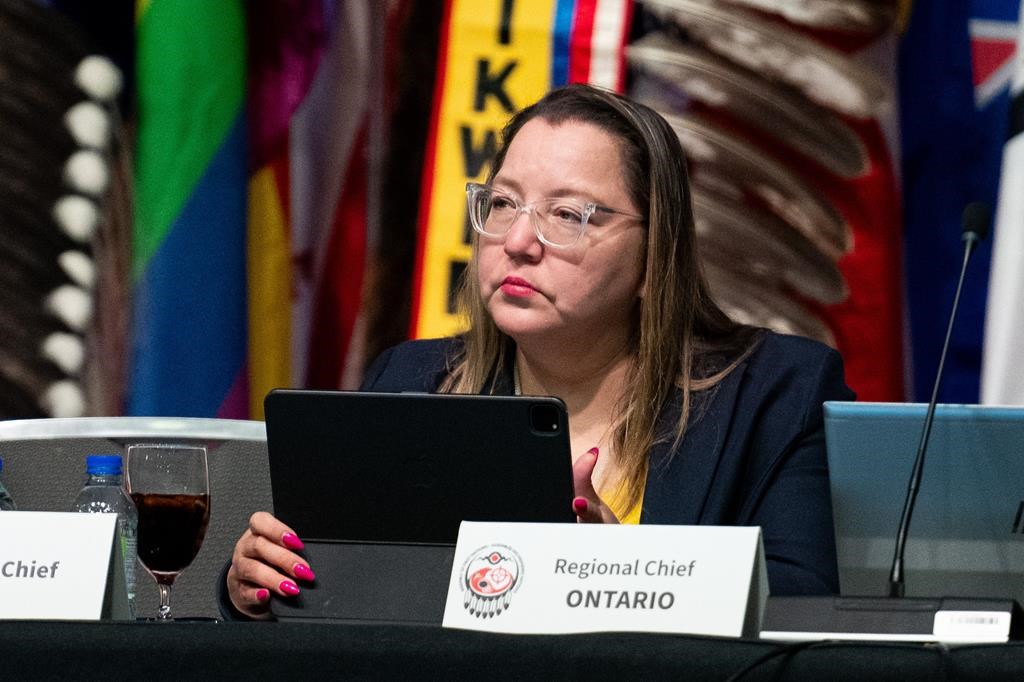Three national Indigenous leaders say Indigenous Peoples should be at the centre of any discussions on how the country should respond to incoming U.S. president Donald Trump’s threats on tariffs and Canada’s territorial sovereignty.
National Chief Cindy Woodhouse Nepinak, Inuit Tapiriit Kanatami President Natan Obed and Métis National Council President Victoria Pruden made that pitch during a meeting with Prime Minister Justin Trudeau on Wednesday morning.
Assembly of First Nations National Chief Cindy Woodhouse Nepinak is seen during the first day of the AFN Special Chiefs Assembly in Ottawa, Tuesday, Dec. 3, 2024. Nepinak says First Nations should be at the centre of any discussions on how the country should respond to threats of tariffs and on territorial sovereignty by president-elect Donald Trump.
CANADIAN PRESS/Spencer Colby
Those same leaders were barred from a meeting with premiers that happened just after, which Obed called a “regressive imagination” of what makes up Canadian governance.
“If we’re trying to unite against an external threat, the idea that provinces, territories and the federal government are the sum total of governance in this country is just an outdated and wrong-headed approach,” he said in an interview with The Canadian Press Thursday, adding the decision for their exclusion laid with the premiers themselves despite Trudeau advocating for their inclusion.
Trump has threatened to impose 25 per cent tariffs on all Canadian goods shipped to the U.S. on his first day back in office next week and has quipped Canada should become the 51st state, along with floating the idea of annexing Greenland — part of the Inuit homelands.
Obed, whose organization is a member of the Inuit Circumpolar Council which represents Inuit in Canada, Alaska, Greenland and Russia, said Inuit have largely mobilized at times like these to support each other, and that he also expects to work closely with Greenlandic and Alaskan Inuit to ensure they act collectively.
“We are ready to play as significant as a role as we possibly can (in Canada-U.S. relations) to articulate the positions of Canada and ultimately, that’s where we want this story to land,” Obed said.
“From a diplomatic sense, we want to ensure that the Government of Canada is taking this threat seriously and that our interests are fully articulated and met.”
Woodhouse Nepinak called Trump’s rhetoric “outlandish” and “disrespectful” and said the territorial rights of Indigenous Peoples on both sides of the border are recognized by international law and predate the founding of both countries.
“First Nations lands hold the key to much of Canada’s wealth, critical minerals and energy resources that are pivotal to domestic prosperity and trade with the United States,” she said in an interview.
She said First Nations should be at the heart of any decisions the prime minister and premiers might make on economic development and trade.
After the meeting with Woodhouse Nepinak, Obed and Pruden, Trudeau met with premiers from each province and territory to debate strategies to deal with Trump’s threats.
Woodhouse Nepinak said that while she welcomed the private meeting with the prime minister to discuss cross-border mobility for First Nations peoples and other areas of concern, First Nations leaders should also have been at the table for the meeting with the premiers.
“It’s unfortunate,” she said.
“There’s been lots of statements made from the president-elect towards our country, and I think one thing’s clear: we all have to stand together and be strong, but work together and make sure that we’re building relationships here in this country.”
In a statement issued Thursday, Matawa First Nations, an advocacy body representing eight First Nations in Ontario, questioned comments by Ontario Premier Doug Ford on critical mineral supplies.
The Ontario government floated the idea of an “Am-Can Critical Mineral Security Alliance” on Thursday that would build out critical mineral supply chains — resources found in Matawa territory.
“Ontario public interest and reconciliation requires progressive leadership at the premier and ministerial levels. As such, the (Matawa Chiefs Council) urges caution to the Ontario public relying on one-sided views held by the Ontario government related to the rights and interests of the Matawa region,” the group wrote.
“The Matawa Chiefs Council call on the premier of Ontario to reconsider the colonial approach underway and meet with us collectively as a matter of priority.”
Woodhouse Nepinak said the premiers need to recognize that First Nations “can’t be left to the sidelines anymore.”
“When we go to court, we win,” she added. “We’ve won over and over again in the provinces.”
The Métis National Council, comprised of the Métis Nation of Ontario and the Métis Nation of Alberta after the departure of three other regions, took part in Wednesday’s meeting with Trudeau.
The Manitoba Métis Federation, which represents descendants of the Red River Métis, did not participate in the meeting.
An unsigned statement released after the meeting says the Métis National Council stressed that tariffs and retaliatory measures will negatively affect Métis peoples and businesses, Indigenous economies and the supply chain at large.
“Together, we must stand united to protect the livelihoods of Indigenous peoples and ensure the strength of the world’s most successful economic relationship,” it reads.
“The Prime Minister acknowledged the important role the Métis National Council plays in these efforts, calling on us to support Team Canada’s approach for the betterment of all Canadians and the Métis Nation.”
Obed said he raised with Trudeau the impact potential tariffs from both the U.S. and Canada would have on Inuit territories — areas that already see a significantly higher cost of living than other regions in the country.
“If there were tariffs placed on top of that, it would make many of the healthy food options in our communities difficult, if not impossible, to purchase,” he said.
“We worry that those who are already at risk would have almost no way of dealing with the added repercussions.”











